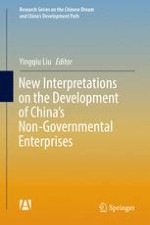2017 | OriginalPaper | Buchkapitel
8. Human Capital Investment: The Fundamental Means to Promote Enterprise Competitiveness
verfasst von : Jianxiong Liu, Xiongbing Zhu
Erschienen in: New Interpretations on the Development of China’s Non-Governmental Enterprises
Verlag: Springer Singapore
Aktivieren Sie unsere intelligente Suche, um passende Fachinhalte oder Patente zu finden.
Wählen Sie Textabschnitte aus um mit Künstlicher Intelligenz passenden Patente zu finden. powered by
Markieren Sie Textabschnitte, um KI-gestützt weitere passende Inhalte zu finden. powered by
